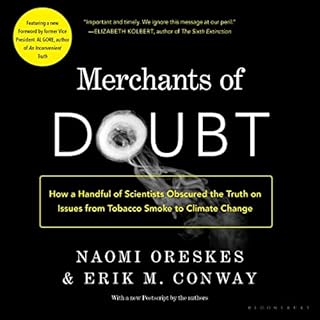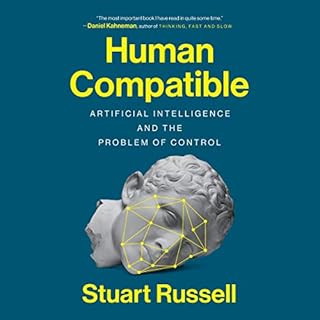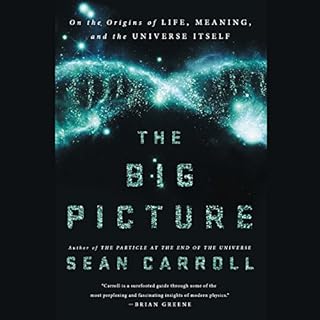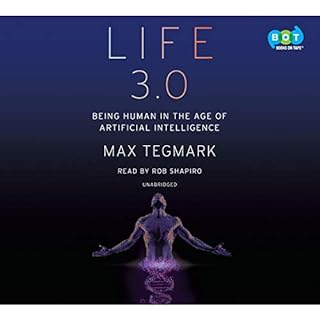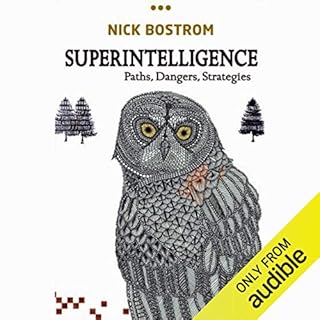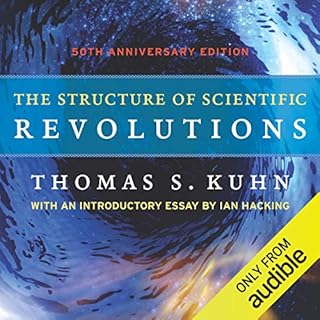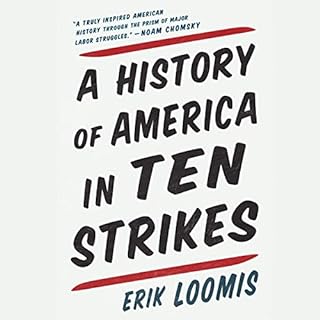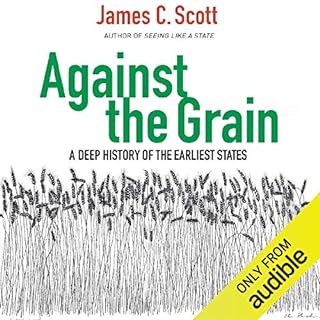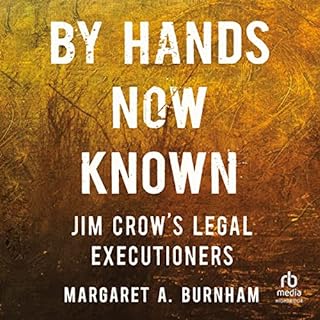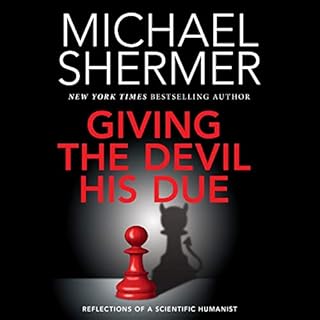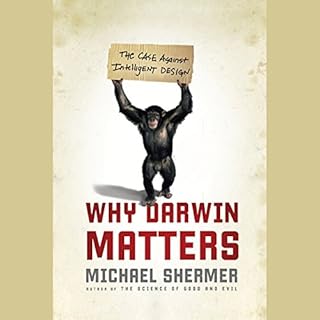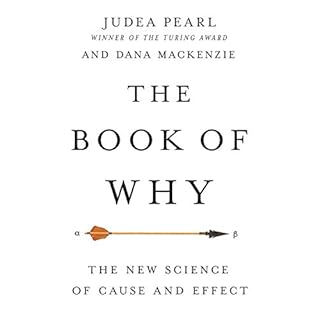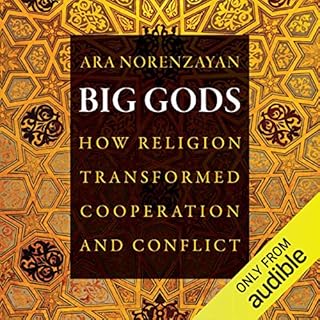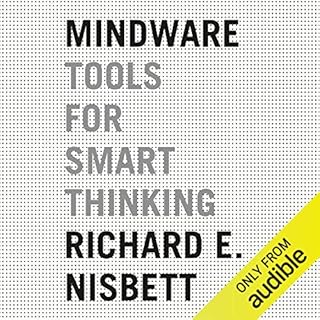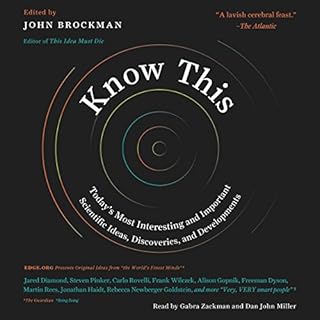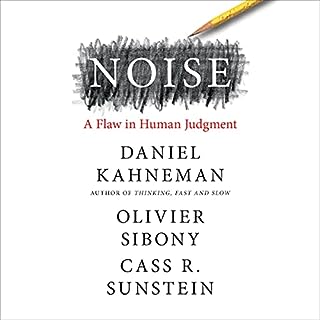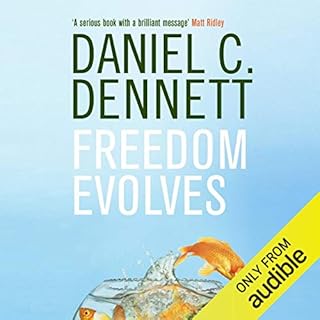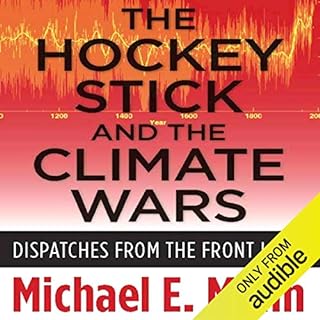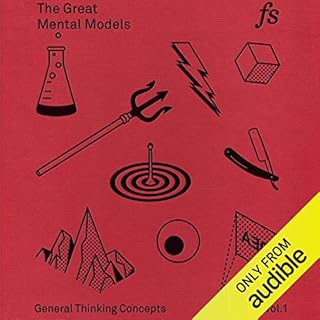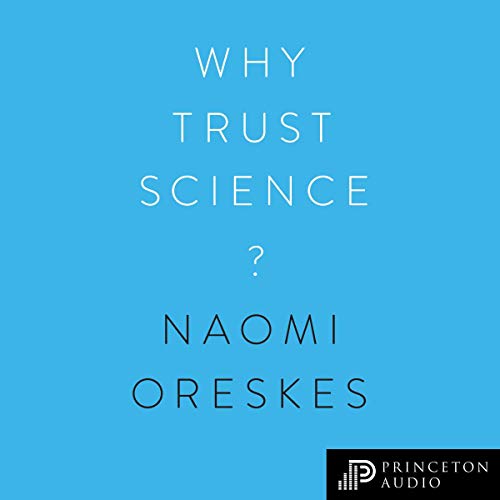
Why Trust Science?
The University Center for Human Values, Book 1
No se pudo agregar al carrito
Add to Cart failed.
Error al Agregar a Lista de Deseos.
Error al eliminar de la lista de deseos.
Error al añadir a tu biblioteca
Error al seguir el podcast
Error al dejar de seguir el podcast
 Exclusivo para miembros Prime: ¿Nuevo en Audible? Obtén 2 audiolibros gratis con tu prueba.
Exclusivo para miembros Prime: ¿Nuevo en Audible? Obtén 2 audiolibros gratis con tu prueba.Compra ahora por $19.46
No default payment method selected.
We are sorry. We are not allowed to sell this product with the selected payment method
-
Narrado por:
-
John Chancer
-
Kelly Burke
-
Kerry Shale
-
Nancy Crane
-
Richard Lyddon
-
De:
-
Naomi Oreskes
Acerca de esta escucha
Why the social character of scientific knowledge makes it trustworthy
Do doctors really know what they are talking about when they tell us vaccines are safe? Should we take climate experts at their word when they warn us about the perils of global warming? Why should we trust science when our own politicians don't? In this landmark book, Naomi Oreskes offers a bold and compelling defense of science, revealing why the social character of scientific knowledge is its greatest strength - and the greatest reason we can trust it.
Tracing the history and philosophy of science from the late 19th century to today, Oreskes explains that, contrary to popular belief, there is no single scientific method. Rather, the trustworthiness of scientific claims derives from the social process by which they are rigorously vetted. This process is not perfect - nothing ever is when humans are involved - but she draws vital lessons from cases where scientists got it wrong. Oreskes shows how consensus is a crucial indicator of when a scientific matter has been settled, and when the knowledge produced is likely to be trustworthy.
Based on the Tanner Lectures on Human Values at Princeton University, this timely and provocative book features critical responses by climate experts Ottmar Edenhofer and Martin Kowarsch, political scientist Jon Krosnick, philosopher of science Marc Lange, and science historian Susan Lindee, as well as a foreword by political theorist Stephen Macedo.
©2019 Naomi Oreskes (P)2019 Princeton University PressLos oyentes también disfrutaron...
-
The Big Myth
- How American Business Taught Us to Loathe Government and Love the Free Market
- De: Naomi Oreskes, Erik M. Conway
- Narrado por: Liza Seneca
- Duración: 21 h y 27 m
- Versión completa
-
General4.5 out of 5 stars 86
-
Narración:4.5 out of 5 stars 74
-
Historia4.5 out of 5 stars 74
In the early 20th century, business elites, trade associations, wealthy powerbrokers, and media allies set out to build a new American orthodoxy: down with 'big government' and up with unfettered markets. With startling archival evidence, Oreskes and Conway document campaigns to rewrite textbooks, combat unions, and defend child labor.
-
5 out of 5 stars
-
Refuting the Chicago School
- De Todd W. Laveen en 06-01-23
De: Naomi Oreskes, y otros
-
Merchants of Doubt
- How a Handful of Scientists Obscured the Truth on Issues from Tobacco Smoke to Global Warming
- De: Naomi Oreskes, Erik M. Conway, Al Gore - foreword
- Narrado por: Liza Seneca
- Duración: 14 h y 23 m
- Versión completa
-
General5 out of 5 stars 37
-
Narración:5 out of 5 stars 30
-
Historia4.5 out of 5 stars 30
Merchants of Doubt has been praised—and attacked—around the world, for reasons easy to understand. This book tells, with “brutal clarity” (Huffington Post), the disquieting story of how a loose-knit group of high-level scientists and scientific advisers, with deep connections in politics and industry, ran effective campaigns to mislead the public and deny well-established scientific knowledge over four decades.
-
5 out of 5 stars
-
heroic
- De Anonymous User en 06-02-23
De: Naomi Oreskes, y otros
-
Human Compatible
- Artificial Intelligence and the Problem of Control
- De: Stuart Russell
- Narrado por: Raphael Corkhill
- Duración: 11 h y 38 m
- Versión completa
-
General4.5 out of 5 stars 579
-
Narración:4.5 out of 5 stars 477
-
Historia4.5 out of 5 stars 470
In the popular imagination, superhuman artificial intelligence is an approaching tidal wave that threatens not just jobs and human relationships, but civilization itself. Conflict between humans and machines is seen as inevitable and its outcome all too predictable. In this groundbreaking audiobook, distinguished AI researcher Stuart Russell argues that this scenario can be avoided, but only if we rethink AI from the ground up. Russell begins by exploring the idea of intelligence in humans and in machines.
-
3 out of 5 stars
-
Good General Introduction to AI Topic
- De Catherine Puma en 03-26-20
De: Stuart Russell
-
Lying
- De: Sam Harris
- Narrado por: Sam Harris
- Duración: 1 h y 15 m
- Versión completa
-
General4.5 out of 5 stars 6,673
-
Narración:4.5 out of 5 stars 5,684
-
Historia4.5 out of 5 stars 5,594
As it was in Anna Karenina, Madame Bovary, and Othello, so it is in life. Most forms of private vice and public evil are kindled and sustained by lies. Acts of adultery and other personal betrayals, financial fraud, government corruption - even murder and genocide - generally require an additional moral defect: a willingness to lie. In Lying, bestselling author and neuroscientist Sam Harris argues that we can radically simplify our lives and improve society by merely telling the truth in situations where others often lie.
-
5 out of 5 stars
-
"Telling The Truth...
- De Douglas en 11-29-13
De: Sam Harris
-
The Collapse of Western Civilization
- A View from the Future
- De: Naomi Oreskes, Erik M. Conway
- Narrado por: Lesa Lockford
- Duración: 2 h y 3 m
- Versión completa
-
General4 out of 5 stars 33
-
Narración:4 out of 5 stars 29
-
Historia4 out of 5 stars 29
The year is 2393, and the world is almost unrecognizable. Clear warnings of climate catastrophe went ignored for decades, leading to soaring temperatures, rising sea levels, widespread drought, and the disaster now known as the Great Collapse of 2093. Dramatizing science in ways traditional nonfiction cannot, The Collapse of Western Civilization reasserts the importance of scientists and the work they do, providing a welcome moment of clarity amid the cacophony of climate-change literature.
-
5 out of 5 stars
-
Good but a tad pedantic
- De bill holck en 02-26-19
De: Naomi Oreskes, y otros
-
The Big Picture
- On the Origins of Life, Meaning, and the Universe Itself
- De: Sean Carroll
- Narrado por: Sean Carroll
- Duración: 17 h y 22 m
- Versión completa
-
General4.5 out of 5 stars 3,136
-
Narración:4.5 out of 5 stars 2,761
-
Historia4.5 out of 5 stars 2,732
Already internationally acclaimed for his elegant, lucid writing on the most challenging notions in modern physics, Sean Carroll is emerging as one of the greatest humanist thinkers of his generation as he brings his extraordinary intellect to bear not only on the Higgs boson and extra dimensions but now also on our deepest personal questions. Where are we? Who are we? Are our emotions, our beliefs, and our hopes and dreams ultimately meaningless out there in the void?
-
5 out of 5 stars
-
ABSOLUTE MUST READ!
- De serine en 05-12-16
De: Sean Carroll
-
The Big Myth
- How American Business Taught Us to Loathe Government and Love the Free Market
- De: Naomi Oreskes, Erik M. Conway
- Narrado por: Liza Seneca
- Duración: 21 h y 27 m
- Versión completa
-
General4.5 out of 5 stars 86
-
Narración:4.5 out of 5 stars 74
-
Historia4.5 out of 5 stars 74
In the early 20th century, business elites, trade associations, wealthy powerbrokers, and media allies set out to build a new American orthodoxy: down with 'big government' and up with unfettered markets. With startling archival evidence, Oreskes and Conway document campaigns to rewrite textbooks, combat unions, and defend child labor.
-
5 out of 5 stars
-
Refuting the Chicago School
- De Todd W. Laveen en 06-01-23
De: Naomi Oreskes, y otros
-
Merchants of Doubt
- How a Handful of Scientists Obscured the Truth on Issues from Tobacco Smoke to Global Warming
- De: Naomi Oreskes, Erik M. Conway, Al Gore - foreword
- Narrado por: Liza Seneca
- Duración: 14 h y 23 m
- Versión completa
-
General5 out of 5 stars 37
-
Narración:5 out of 5 stars 30
-
Historia4.5 out of 5 stars 30
Merchants of Doubt has been praised—and attacked—around the world, for reasons easy to understand. This book tells, with “brutal clarity” (Huffington Post), the disquieting story of how a loose-knit group of high-level scientists and scientific advisers, with deep connections in politics and industry, ran effective campaigns to mislead the public and deny well-established scientific knowledge over four decades.
-
5 out of 5 stars
-
heroic
- De Anonymous User en 06-02-23
De: Naomi Oreskes, y otros
-
Human Compatible
- Artificial Intelligence and the Problem of Control
- De: Stuart Russell
- Narrado por: Raphael Corkhill
- Duración: 11 h y 38 m
- Versión completa
-
General4.5 out of 5 stars 579
-
Narración:4.5 out of 5 stars 477
-
Historia4.5 out of 5 stars 470
In the popular imagination, superhuman artificial intelligence is an approaching tidal wave that threatens not just jobs and human relationships, but civilization itself. Conflict between humans and machines is seen as inevitable and its outcome all too predictable. In this groundbreaking audiobook, distinguished AI researcher Stuart Russell argues that this scenario can be avoided, but only if we rethink AI from the ground up. Russell begins by exploring the idea of intelligence in humans and in machines.
-
3 out of 5 stars
-
Good General Introduction to AI Topic
- De Catherine Puma en 03-26-20
De: Stuart Russell
-
Lying
- De: Sam Harris
- Narrado por: Sam Harris
- Duración: 1 h y 15 m
- Versión completa
-
General4.5 out of 5 stars 6,673
-
Narración:4.5 out of 5 stars 5,684
-
Historia4.5 out of 5 stars 5,594
As it was in Anna Karenina, Madame Bovary, and Othello, so it is in life. Most forms of private vice and public evil are kindled and sustained by lies. Acts of adultery and other personal betrayals, financial fraud, government corruption - even murder and genocide - generally require an additional moral defect: a willingness to lie. In Lying, bestselling author and neuroscientist Sam Harris argues that we can radically simplify our lives and improve society by merely telling the truth in situations where others often lie.
-
5 out of 5 stars
-
"Telling The Truth...
- De Douglas en 11-29-13
De: Sam Harris
-
The Collapse of Western Civilization
- A View from the Future
- De: Naomi Oreskes, Erik M. Conway
- Narrado por: Lesa Lockford
- Duración: 2 h y 3 m
- Versión completa
-
General4 out of 5 stars 33
-
Narración:4 out of 5 stars 29
-
Historia4 out of 5 stars 29
The year is 2393, and the world is almost unrecognizable. Clear warnings of climate catastrophe went ignored for decades, leading to soaring temperatures, rising sea levels, widespread drought, and the disaster now known as the Great Collapse of 2093. Dramatizing science in ways traditional nonfiction cannot, The Collapse of Western Civilization reasserts the importance of scientists and the work they do, providing a welcome moment of clarity amid the cacophony of climate-change literature.
-
5 out of 5 stars
-
Good but a tad pedantic
- De bill holck en 02-26-19
De: Naomi Oreskes, y otros
-
The Big Picture
- On the Origins of Life, Meaning, and the Universe Itself
- De: Sean Carroll
- Narrado por: Sean Carroll
- Duración: 17 h y 22 m
- Versión completa
-
General4.5 out of 5 stars 3,136
-
Narración:4.5 out of 5 stars 2,761
-
Historia4.5 out of 5 stars 2,732
Already internationally acclaimed for his elegant, lucid writing on the most challenging notions in modern physics, Sean Carroll is emerging as one of the greatest humanist thinkers of his generation as he brings his extraordinary intellect to bear not only on the Higgs boson and extra dimensions but now also on our deepest personal questions. Where are we? Who are we? Are our emotions, our beliefs, and our hopes and dreams ultimately meaningless out there in the void?
-
5 out of 5 stars
-
ABSOLUTE MUST READ!
- De serine en 05-12-16
De: Sean Carroll
-
Life 3.0
- Being Human in the Age of Artificial Intelligence
- De: Max Tegmark
- Narrado por: Rob Shapiro
- Duración: 13 h y 29 m
- Versión completa
-
General4.5 out of 5 stars 5,910
-
Narración:4.5 out of 5 stars 5,130
-
Historia4.5 out of 5 stars 5,113
How will artificial intelligence affect crime, war, justice, jobs, society, and our very sense of being human? The rise of AI has the potential to transform our future more than any other technology - and there's nobody better qualified or situated to explore that future than Max Tegmark, an MIT professor who's helped mainstream research on how to keep AI beneficial.
-
3 out of 5 stars
-
Irritating
- De Thomas Cotter en 10-25-17
De: Max Tegmark
-
Steve Jobs
- De: Walter Isaacson
- Narrado por: Dylan Baker
- Duración: 25 h y 18 m
- Versión completa
-
General4.5 out of 5 stars 34,627
-
Narración:4.5 out of 5 stars 30,259
-
Historia4.5 out of 5 stars 30,196
Based on more than 40 interviews with Jobs conducted over two years—as well as interviews with more than a hundred family members, friends, adversaries, competitors, and colleagues—Walter Isaacson has written a riveting story of the roller-coaster life and searingly intense personality of a creative entrepreneur whose passion for perfection and ferocious drive revolutionized six industries: personal computers, animated movies, music, phones, tablet computing, and digital publishing.
-
4 out of 5 stars
-
Good Biography, Fine narrator
- De Chris en 10-27-11
De: Walter Isaacson
-
Zero to One
- Notes on Startups, or How to Build the Future
- De: Peter Thiel, Blake Masters
- Narrado por: Blake Masters
- Duración: 4 h y 50 m
- Versión completa
-
General4.5 out of 5 stars 24,289
-
Narración:4.5 out of 5 stars 20,209
-
Historia4.5 out of 5 stars 20,114
The great secret of our time is that there are still uncharted frontiers to explore and new inventions to create. In Zero to One, legendary entrepreneur and investor Peter Thiel shows how we can find singular ways to create those new things.
-
4 out of 5 stars
-
Seems Insightful Until You Think A Little Deeper
- De Mark Brandon en 10-31-14
De: Peter Thiel, y otros
-
Superintelligence
- Paths, Dangers, Strategies
- De: Nick Bostrom
- Narrado por: Napoleon Ryan
- Duración: 14 h y 17 m
- Versión completa
-
General4 out of 5 stars 4,338
-
Narración:4 out of 5 stars 3,742
-
Historia4 out of 5 stars 3,703
Superintelligence asks the questions: What happens when machines surpass humans in general intelligence? Will artificial agents save or destroy us? Nick Bostrom lays the foundation for understanding the future of humanity and intelligent life. The human brain has some capabilities that the brains of other animals lack. It is to these distinctive capabilities that our species owes its dominant position. If machine brains surpassed human brains in general intelligence, then this new superintelligence could become extremely powerful - possibly beyond our control.
-
5 out of 5 stars
-
Colossus: The Forbin Project is coming
- De Gary en 09-12-14
De: Nick Bostrom
-
The Structure of Scientific Revolutions
- De: Thomas S. Kuhn
- Narrado por: Dennis Holland
- Duración: 10 h y 14 m
- Versión completa
-
General4 out of 5 stars 1,155
-
Narración:4 out of 5 stars 833
-
Historia4 out of 5 stars 815
A good book may have the power to change the way we see the world, but a great book actually becomes part of our daily consciousness, pervading our thinking to the point that we take it for granted, and we forget how provocative and challenging its ideas once were - and still are. The Structure of Scientific Revolutions is that kind of book.
-
3 out of 5 stars
-
The problem is not with the book
- De Marcus en 08-09-09
De: Thomas S. Kuhn
-
Fixer-Upper
- How to Repair America’s Broken Housing Systems
- De: Jenny Schuetz
- Narrado por: Suzie Althens
- Duración: 5 h y 46 m
- Versión completa
-
General4.5 out of 5 stars 39
-
Narración:4.5 out of 5 stars 35
-
Historia4.5 out of 5 stars 34
Much ink has been spilled in recent years talking about political divides and inequality in the United States. But these discussions too often miss one of the most important factors in the divisions among Americans: the fundamentally unequal nature of the nation's housing systems. Increasingly, important life outcomes—performance in school, employment, even life expectancy—are determined by where people live and the quality of homes they live in. Fixer-Upper is the first book assessing how local, state, and national housing policies affect people and communities.
-
4 out of 5 stars
-
Good review
- De A. F. Davis en 09-16-22
De: Jenny Schuetz
-
Achieving Our Country
- Leftist Thought in Twentieth-Century America
- De: Richard Rorty
- Narrado por: James Patrick Cronin
- Duración: 3 h y 24 m
- Versión completa
-
General4.5 out of 5 stars 171
-
Narración:4.5 out of 5 stars 147
-
Historia4.5 out of 5 stars 146
Must the sins of America's past poison its hope for the future? Lately the American Left, withdrawing into the ivied halls of academe to rue the nation's shame, has answered "yes" in both word and deed. In Achieving Our Country, one of America's foremost philosophers challenges this lost generation of the Left to understand the role it might play in the great tradition of democratic intellectual labor that started with writers like Walt Whitman and John Dewey.
-
5 out of 5 stars
-
Eloquent yet misunderstood pragmatist
- De Bill Storage en 04-26-18
De: Richard Rorty
-
A History of America in Ten Strikes
- De: Erik Loomis
- Narrado por: Brian Troxell
- Duración: 9 h y 17 m
- Versión completa
-
General4.5 out of 5 stars 176
-
Narración:4.5 out of 5 stars 154
-
Historia4.5 out of 5 stars 153
Powerful and accessible, A History of America in Ten Strikes challenges all of our contemporary assumptions around labor, unions, and American workers. In this brilliant book, labor historian Erik Loomis recounts ten critical workers’ strikes in American labor history that everyone needs to know about (and then provides an annotated list of the 150 most important moments in American labor history in the appendix).
-
5 out of 5 stars
-
great read
- De Perscors en 03-17-19
De: Erik Loomis
-
The Gay Science (The Joyful Wisdom)
- De: Friedrich Nietzsche
- Narrado por: Michael Lunts
- Duración: 10 h y 55 m
- Versión completa
-
General4.5 out of 5 stars 161
-
Narración:4.5 out of 5 stars 136
-
Historia4.5 out of 5 stars 138
The Gay Science (The Joyful Wisdom) is one of Nietzsche's greatest books. His wonderfully fertile mind roams over mankind, his thoughts, his emotions, his behaviour and his weaknesses with remarkable clarity, with insight - but also with humour!In this work are 383 separate paragraphs, some short, some long, but all singular observations - the epitome of his famous aphoristic style. 'Morality is the herd instinct in the individual.'
-
5 out of 5 stars
-
I am now a full-fledged fan of Nietzsche
- De RS en 02-24-18
-
Against the Grain
- A Deep History of the Earliest States
- De: James C. Scott
- Narrado por: Eric Jason Martin
- Duración: 8 h y 35 m
- Versión completa
-
General4.5 out of 5 stars 867
-
Narración:4.5 out of 5 stars 722
-
Historia4.5 out of 5 stars 717
Why did humans abandon hunting and gathering for sedentary communities dependent on livestock and cereal grains and governed by precursors of today's states? Most people believe that plant and animal domestication allowed humans, finally, to settle down and form agricultural villages, towns, and states, which made possible civilization, law, public order, and a presumably secure way of living. But archaeological and historical evidence challenges this narrative.
-
4 out of 5 stars
-
World without Women
- De Paul Richards en 04-28-18
De: James C. Scott
-
By Hands Now Known
- Jim Crow's Legal Executioners
- De: Margaret A. Burnham
- Narrado por: Diana Blue
- Duración: 10 h y 59 m
- Versión completa
-
General4.5 out of 5 stars 42
-
Narración:4 out of 5 stars 37
-
Historia5 out of 5 stars 37
Margaret A. Burnham challenges our understanding of the Jim Crow era by exploring the relationship between formal law and background legal norms in harrowing cases between 1920 and 1960. From rendition, the legal process by which states make claims to other states for the return of their citizens, to battles over state and federal jurisdiction and the outsize role of local sheriffs in enforcing racial hierarchy, Burnham maps the criminal legal system of the mid-twentieth-century South, and traces the line from slavery to the legal structures of this period—and through to today.
-
5 out of 5 stars
-
Heartbreaking
- De sharon en 11-24-22
-
The Tragedy of Great Power Politics
- De: John J. Mearsheimer
- Narrado por: Mark Ashby
- Duración: 16 h y 14 m
- Versión completa
-
General4.5 out of 5 stars 324
-
Narración:4.5 out of 5 stars 263
-
Historia4.5 out of 5 stars 259
A decade after the cold war ended, policy makers and academics foresaw a new era of peace and prosperity, an era in which democracy and open trade would herald the "end of history." The terrorist attacks of September 11, 2001, sadly shattered these idyllic illusions, and John Mearsheimer's masterful new book explains why these harmonious visions remain utopian.
-
5 out of 5 stars
-
Exceptional
- De Logical Paradox en 08-19-14
Reseñas de la Crítica
"Oreskes joins a distinguished line of thinkers who explain why we should trust the findings of the scientific community...[and] clearly reminds readers that science has consistently brought home the bacon." (Kirkus Reviews)
Relacionado con este tema
-
Giving the Devil His Due
- Reflections of a Scientific Humanist
- De: Michael Shermer
- Narrado por: Michael Shermer
- Duración: 13 h y 25 m
- Versión completa
-
General4.5 out of 5 stars 155
-
Narración:4 out of 5 stars 128
-
Historia4.5 out of 5 stars 125
Who is the "Devil"? And what is he due? The devil is anyone who disagrees with you. And what he is due is the right to speak his mind. He must have this for your own safety's sake, because his freedom is inextricably tied to your own. If he can be censored, why shouldn't you be censored? If we put barriers up to silence "unpleasant" ideas, what's to stop the silencing of any discussion? This book is a full-throated defense of free speech and open inquiry in politics, science, and culture by the New York Times best-selling author and skeptic Michael Shermer.
-
3 out of 5 stars
-
Flawed Audio
- De Private en 04-10-20
De: Michael Shermer
-
Breaking the Spell
- Religion as a Natural Phenomenon
- De: Daniel C. Dennett
- Narrado por: Dennis Holland
- Duración: 12 h y 19 m
- Versión completa
-
General4.5 out of 5 stars 759
-
Narración:4.5 out of 5 stars 662
-
Historia4.5 out of 5 stars 649
For all the thousands of books that have been written about religion, few until this one have attempted to examine it scientifically: to ask why - and how - it has shaped so many lives so strongly. Is religion a product of blind evolutionary instinct or rational choice? Is it truly the best way to live a moral life? Ranging through biology, history, and psychology, Daniel C. Dennett charts religion’s evolution from “wild” folk belief to “domesticated” dogma.
-
5 out of 5 stars
-
Great Reader Actually Enhances A Great Book!
- De Don Caliente en 07-14-14
-
The Structure of Scientific Revolutions
- De: Thomas S. Kuhn
- Narrado por: Dennis Holland
- Duración: 10 h y 14 m
- Versión completa
-
General4 out of 5 stars 1,155
-
Narración:4 out of 5 stars 833
-
Historia4 out of 5 stars 815
A good book may have the power to change the way we see the world, but a great book actually becomes part of our daily consciousness, pervading our thinking to the point that we take it for granted, and we forget how provocative and challenging its ideas once were - and still are. The Structure of Scientific Revolutions is that kind of book.
-
3 out of 5 stars
-
The problem is not with the book
- De Marcus en 08-09-09
De: Thomas S. Kuhn
-
Expert Political Judgment
- How Good is it? How can We Know?
- De: Philip E. Tetlock
- Narrado por: Anthony Haden Salerno
- Duración: 9 h y 48 m
- Versión completa
-
General4 out of 5 stars 107
-
Narración:3.5 out of 5 stars 95
-
Historia4 out of 5 stars 94
The intelligence failures surrounding the invasion of Iraq dramatically illustrate the necessity of developing standards for evaluating expert opinion. This audiobook fills that need. Here, Philip E. Tetlock explores what constitutes good judgment in predicting future events, and looks at why experts are often wrong in their forecasts. Tetlock first discusses arguments about whether the world is too complex for people to find the tools to understand political phenomena, let alone predict the future.
-
4 out of 5 stars
-
Five-star book, one-star reading
- De Christian Tarsney en 01-23-19
-
Why Darwin Matters
- The Case for Evolution and Against Intelligent Design
- De: Michael Shermer
- Narrado por: uncredited
- Duración: 4 h y 22 m
- Versión resumida
-
General4.5 out of 5 stars 170
-
Narración:4.5 out of 5 stars 105
-
Historia4.5 out of 5 stars 105
Columnist and publisher Michael Shermer, once an evangelical Christian and a creationist, argues that Intelligent Design proponents invoke a combination of ad science, political antipathy, and flawed theology in their new brand of creationism. He refutes their pseudoscientific arguments and then demonstrates why conservatives and people of faith can and should embrace evolution. Why Darwin Matters is an incisive examination of what is at stake in the debate over evolution.
-
1 out of 5 stars
-
TOTAL MISREPRENTATION: WHERE IS THE EVIDENCE?
- De Theo Tsourdalakis en 09-04-11
De: Michael Shermer
-
The Book of Why
- The New Science of Cause and Effect
- De: Judea Pearl, Dana Mackenzie
- Narrado por: Mel Foster
- Duración: 15 h y 14 m
- Versión completa
-
General4.5 out of 5 stars 835
-
Narración:4.5 out of 5 stars 690
-
Historia4.5 out of 5 stars 688
"Correlation does not imply causation". This mantra has been invoked by scientists for decades and has led to a virtual prohibition on causal talk. But today, that taboo is dead. The causal revolution, sparked by Judea Pearl and his colleagues, has cut through a century of confusion and placed causality - the study of cause and effect - on a firm scientific basis.
-
5 out of 5 stars
-
Great book! Not a great audiobook.
- De rrwright en 05-30-18
De: Judea Pearl, y otros
-
Giving the Devil His Due
- Reflections of a Scientific Humanist
- De: Michael Shermer
- Narrado por: Michael Shermer
- Duración: 13 h y 25 m
- Versión completa
-
General4.5 out of 5 stars 155
-
Narración:4 out of 5 stars 128
-
Historia4.5 out of 5 stars 125
Who is the "Devil"? And what is he due? The devil is anyone who disagrees with you. And what he is due is the right to speak his mind. He must have this for your own safety's sake, because his freedom is inextricably tied to your own. If he can be censored, why shouldn't you be censored? If we put barriers up to silence "unpleasant" ideas, what's to stop the silencing of any discussion? This book is a full-throated defense of free speech and open inquiry in politics, science, and culture by the New York Times best-selling author and skeptic Michael Shermer.
-
3 out of 5 stars
-
Flawed Audio
- De Private en 04-10-20
De: Michael Shermer
-
Breaking the Spell
- Religion as a Natural Phenomenon
- De: Daniel C. Dennett
- Narrado por: Dennis Holland
- Duración: 12 h y 19 m
- Versión completa
-
General4.5 out of 5 stars 759
-
Narración:4.5 out of 5 stars 662
-
Historia4.5 out of 5 stars 649
For all the thousands of books that have been written about religion, few until this one have attempted to examine it scientifically: to ask why - and how - it has shaped so many lives so strongly. Is religion a product of blind evolutionary instinct or rational choice? Is it truly the best way to live a moral life? Ranging through biology, history, and psychology, Daniel C. Dennett charts religion’s evolution from “wild” folk belief to “domesticated” dogma.
-
5 out of 5 stars
-
Great Reader Actually Enhances A Great Book!
- De Don Caliente en 07-14-14
-
The Structure of Scientific Revolutions
- De: Thomas S. Kuhn
- Narrado por: Dennis Holland
- Duración: 10 h y 14 m
- Versión completa
-
General4 out of 5 stars 1,155
-
Narración:4 out of 5 stars 833
-
Historia4 out of 5 stars 815
A good book may have the power to change the way we see the world, but a great book actually becomes part of our daily consciousness, pervading our thinking to the point that we take it for granted, and we forget how provocative and challenging its ideas once were - and still are. The Structure of Scientific Revolutions is that kind of book.
-
3 out of 5 stars
-
The problem is not with the book
- De Marcus en 08-09-09
De: Thomas S. Kuhn
-
Expert Political Judgment
- How Good is it? How can We Know?
- De: Philip E. Tetlock
- Narrado por: Anthony Haden Salerno
- Duración: 9 h y 48 m
- Versión completa
-
General4 out of 5 stars 107
-
Narración:3.5 out of 5 stars 95
-
Historia4 out of 5 stars 94
The intelligence failures surrounding the invasion of Iraq dramatically illustrate the necessity of developing standards for evaluating expert opinion. This audiobook fills that need. Here, Philip E. Tetlock explores what constitutes good judgment in predicting future events, and looks at why experts are often wrong in their forecasts. Tetlock first discusses arguments about whether the world is too complex for people to find the tools to understand political phenomena, let alone predict the future.
-
4 out of 5 stars
-
Five-star book, one-star reading
- De Christian Tarsney en 01-23-19
-
Why Darwin Matters
- The Case for Evolution and Against Intelligent Design
- De: Michael Shermer
- Narrado por: uncredited
- Duración: 4 h y 22 m
- Versión resumida
-
General4.5 out of 5 stars 170
-
Narración:4.5 out of 5 stars 105
-
Historia4.5 out of 5 stars 105
Columnist and publisher Michael Shermer, once an evangelical Christian and a creationist, argues that Intelligent Design proponents invoke a combination of ad science, political antipathy, and flawed theology in their new brand of creationism. He refutes their pseudoscientific arguments and then demonstrates why conservatives and people of faith can and should embrace evolution. Why Darwin Matters is an incisive examination of what is at stake in the debate over evolution.
-
1 out of 5 stars
-
TOTAL MISREPRENTATION: WHERE IS THE EVIDENCE?
- De Theo Tsourdalakis en 09-04-11
De: Michael Shermer
-
The Book of Why
- The New Science of Cause and Effect
- De: Judea Pearl, Dana Mackenzie
- Narrado por: Mel Foster
- Duración: 15 h y 14 m
- Versión completa
-
General4.5 out of 5 stars 835
-
Narración:4.5 out of 5 stars 690
-
Historia4.5 out of 5 stars 688
"Correlation does not imply causation". This mantra has been invoked by scientists for decades and has led to a virtual prohibition on causal talk. But today, that taboo is dead. The causal revolution, sparked by Judea Pearl and his colleagues, has cut through a century of confusion and placed causality - the study of cause and effect - on a firm scientific basis.
-
5 out of 5 stars
-
Great book! Not a great audiobook.
- De rrwright en 05-30-18
De: Judea Pearl, y otros
-
Big Gods
- How Religion Transformed Cooperation and Conflict
- De: Ara Norenzayan
- Narrado por: Paul Nixon
- Duración: 8 h y 33 m
- Versión completa
-
General4.5 out of 5 stars 61
-
Narración:4 out of 5 stars 49
-
Historia4.5 out of 5 stars 49
How did human societies scale up from small, tight-knit groups of hunter-gatherers to the large, anonymous, cooperative societies of today - even though anonymity is the enemy of cooperation? How did organized religions with "Big Gods" - the great monotheistic and polytheistic faiths - spread to colonize most minds in the world? In Big Gods, Ara Norenzayan makes the surprising and provocative argument that these fundamental puzzles about the origins of civilization are one and the same, and answer each other.
-
5 out of 5 stars
-
Great read
- De paro en 02-27-24
De: Ara Norenzayan
-
Native American DNA
- Tribal Belonging and the False Promise of Genetic Science
- De: Kim TallBear
- Narrado por: Donna Postel
- Duración: 10 h y 9 m
- Versión completa
-
General4.5 out of 5 stars 44
-
Narración:4.5 out of 5 stars 37
-
Historia4.5 out of 5 stars 37
In Native American DNA, Kim TallBear shows how DNA testing is a powerful - and problematic - scientific process that is useful in determining close biological relatives. But tribal membership is a legal category that has developed in dependence on certain social understandings and historical contexts, a set of concepts that entangles genetic information in a web of family relations, reservation histories, tribal rules, and government regulations.
-
5 out of 5 stars
-
A good title to return to
- De wilson pipkin en 11-17-24
De: Kim TallBear
-
Mindware
- Tools for Smart Thinking
- De: Richard E. Nisbett
- Narrado por: Joe Barrett
- Duración: 10 h y 17 m
- Versión completa
-
General4 out of 5 stars 510
-
Narración:4 out of 5 stars 434
-
Historia4 out of 5 stars 427
Many scientific and philosophical ideas are so powerful that they can be applied to our lives at home, work, and school to help us think smarter and more effectively about our behavior and the world around us. Surprisingly, many of these ideas remain unknown to most of us. In Mindware, the world-renowned psychologist Richard Nisbett presents these ideas in clear and accessible detail, offering a tool kit for better thinking and wiser decisions.
-
5 out of 5 stars
-
Sound scientific advice on how to live your life
- De Neuron en 08-26-15
-
Know This
- Today's Most Interesting and Important Scientific Ideas, Discoveries, and Developments
- De: John Brockman
- Narrado por: Gabra Zackman, Dan John Miller
- Duración: 14 h y 39 m
- Versión completa
-
General4 out of 5 stars 232
-
Narración:4 out of 5 stars 204
-
Historia4 out of 5 stars 201
Scientific developments radically alter our understanding of the world. Whether it's technology, climate change, health research, or the latest revelations of neuroscience, physics, or psychology, science has, as Edge editor John Brockman says, "become a big story, if not the big story". In that spirit this new addition to Edge.org's fascinating series asks a powerful and provocative question: What do you consider the most interesting and important recent scientific news?
-
1 out of 5 stars
-
Pete and Repeat and Re-repeat
- De Daniel L en 02-25-18
De: John Brockman
-
The Twilight of the American Enlightenment
- The 1950s and the Crisis of Liberal Belief
- De: George M. Marsden
- Narrado por: William Hughes
- Duración: 6 h y 24 m
- Versión completa
-
General4.5 out of 5 stars 114
-
Narración:4.5 out of 5 stars 91
-
Historia4.5 out of 5 stars 91
In the aftermath of World War II, the United States stood at a precipice. The forces of modernity unleashed by the war had led to astonishing advances in daily life, but technology and mass culture also threatened to erode the country's traditional moral character. As award-winning historian George M. Marsden explains in The Twilight of the American Enlightenment, postwar Americans looked to the country's secular liberalelites for guidance in this precarious time, but these intellectuals proved unable to articulate a coherent common cause by which America could chart its course.
-
4 out of 5 stars
-
Such a relevant book to our current world
- De Adam Shields en 09-14-16
-
Noise
- A Flaw in Human Judgment
- De: Daniel Kahneman, Olivier Sibony, Cass R. Sunstein
- Narrado por: Jonathan Todd Ross
- Duración: 13 h y 28 m
- Versión completa
-
General4.5 out of 5 stars 1,419
-
Narración:4.5 out of 5 stars 1,155
-
Historia4.5 out of 5 stars 1,144
From the best-selling author of Thinking, Fast and Slow, the co-author of Nudge, and the author of You Are About to Make a Terrible Mistake! comes Noise, a revolutionary exploration of why people make bad judgments, and how to control both noise and cognitive bias.
-
1 out of 5 stars
-
Disappointing
- De Z28 en 05-31-21
De: Daniel Kahneman, y otros
-
Freedom Evolves
- De: Daniel C. Dennett
- Narrado por: Robert Blumenfeld
- Duración: 11 h y 21 m
- Versión completa
-
General4.5 out of 5 stars 135
-
Narración:4 out of 5 stars 113
-
Historia4.5 out of 5 stars 112
Can there be freedom and free will in a deterministic world? Renowned philosopher Daniel Dennett emphatically answers "yes!" Using an array of provocative formulations, Dennett sets out to show how we alone among the animals have evolved minds that give us free will and morality. Weaving a richly detailed narrative, Dennett explains in a series of strikingly original arguments - drawing upon evolutionary biology, cognitive neuroscience, economics, and philosophy - that far from being an enemy of traditional explorations of freedom, morality, and meaning, the evolutionary perspective can be an indispensable ally.
-
5 out of 5 stars
-
I knew I was going to like this book
- De Gary en 05-30-14
-
The Hockey Stick and the Climate Wars
- De: Michael Mann
- Narrado por: Luke Daniels
- Duración: 11 h y 54 m
- Versión completa
-
General4.5 out of 5 stars 56
-
Narración:4.5 out of 5 stars 51
-
Historia4.5 out of 5 stars 50
In its 2001 report on global climate, the Intergovernmental Panel on Climate Change of the United Nations prominently featured the "Hockey Stick", a chart showing global temperature data over the past 1,000 years. The Hockey Stick demonstrated that temperature had risen with the increase in industrialization and use of fossil fuels. The inescapable conclusion was that worldwide human activity since the industrial age had raised CO2 levels, trapping greenhouse gases in the atmosphere and warming the planet.
-
5 out of 5 stars
-
Speaking truth to power
- De Anonymous User en 06-06-24
De: Michael Mann
-
The Scientist in the Early Roman Empire
- De: Richard Carrier
- Narrado por: Richard Carrier
- Duración: 18 h y 29 m
- Versión completa
-
General4.5 out of 5 stars 49
-
Narración:4.5 out of 5 stars 45
-
Historia4.5 out of 5 stars 43
In this extensive sequel to Science Education in the Early Roman Empire, Dr. Richard Carrier explores the social history of scientists in the Roman era. Was science in decline or experiencing a revival under the Romans? What was an ancient scientist thought to be and do? Who were they, and who funded their research? And how did pagans differ from their Christian peers in their views toward science and scientists?
-
5 out of 5 stars
-
This Book is a Bombshell
- De James en 06-15-18
De: Richard Carrier
-
The God Argument
- The Case Against Religion and for Humanism
- De: A. C. Grayling
- Narrado por: William Roberts
- Duración: 7 h y 59 m
- Versión completa
-
General4.5 out of 5 stars 210
-
Narración:4.5 out of 5 stars 193
-
Historia4.5 out of 5 stars 190
What are the arguments for and against religion and religious belief - all of them - right across the range of reasons and motives that people have for being religious, and do they stand up to scrutiny? Can there be a clear, full statement of these arguments that once and for all will show what is at stake in this debate? Equally important: what is the alternative to religion as a view of the world and a foundation for morality?
-
2 out of 5 stars
-
Fascinating Topic Made Mind Numbingly Dull
- De m.emery en 06-17-15
De: A. C. Grayling
-
Theory and History
- An Interpretation of Social and Economic Evolution (LvMI)
- De: Ludwig von Mises, Murray Rothbard
- Narrado por: John Pruden
- Duración: 10 h y 59 m
- Versión completa
-
General4.5 out of 5 stars 57
-
Narración:4.5 out of 5 stars 48
-
Historia4.5 out of 5 stars 47
Like F.A. Hayek, Ludwig von Mises moved beyond economics in his later years to address questions regarding the foundation of all social science. But unlike Hayek's attempts, Mises' writings on these matters have received less attention than they deserve. Theory and History, writes Rothbard in his introduction, "remains by far the most neglected masterwork of Mises". Here Mises defends his all-important idea of methodological dualism: one approach to the hard sciences and another for the social sciences.
-
5 out of 5 stars
-
Without This Book, You Are Uneducated
- De Michael D. Rubin en 10-03-18
De: Ludwig von Mises, y otros
-
The Great Mental Models
- General Thinking Concepts
- De: Shane Parrish
- Narrado por: Shane Parrish
- Duración: 3 h y 23 m
- Versión completa
-
General4.5 out of 5 stars 1,650
-
Narración:4 out of 5 stars 1,371
-
Historia4.5 out of 5 stars 1,352
The Great Mental Models: General Thinking Concepts is the first book in The Great Mental Models series designed to upgrade your thinking with the best, most useful and powerful tools so you always have the right one on hand. This volume details nine of the most versatile all-purpose mental models you can use right away to improve your decision making, your productivity, and how clearly you see the world.
-
2 out of 5 stars
-
A dissapointing debut
- De Peter en 04-14-19
De: Shane Parrish
Lo que los oyentes dicen sobre Why Trust Science?
Calificaciones medias de los clientesReseñas - Selecciona las pestañas a continuación para cambiar el origen de las reseñas.
-
Total5 out of 5 stars
-
Ejecución5 out of 5 stars
-
Historia5 out of 5 stars
- DK
- 10-30-23
Thorough treatment of a tricky topic
As a non-scientist, I found this book answered most of my questions about how to think about the validity of scientific work. Some content was familiar from other books, but this book put everything together in a way that finally made sense. Her case was meticulously constructed. I might listen again to make sure that as much as possible sinks in.
Se ha producido un error. Vuelve a intentarlo dentro de unos minutos.
Has calificado esta reseña.
Reportaste esta reseña
-
Total5 out of 5 stars
-
Ejecución5 out of 5 stars
-
Historia5 out of 5 stars
- Andrew Mazibrada
- 01-15-20
Perfect Production of an Excellent Work
Naomi Oreskes has written two superb books in recent years, both of which have been produced as audiobooks: 'The Merchants of Doubt' and 'Why Trust Science?' Sheila Jasanoff, to whom Oreskes refers in the latter, has also written several excellent similar and complementary recent works, only one of which has been produced as an audiobook: 'The Ethics of Invention'. All are insightful, deeply scholarly works, compellingly argued and evidenced, and extremely relevant for our technologically advanced yet epistemologically uncertain age.
Yet this review focuses on something I hope producers will take note of when it comes to detailed academic texts: the narrator is absolutely key to allowing audiences to understand what may be heavily nuanced, complex arguments. Far more so than in fiction. As I found with Samuel Moyn's 'Not Enough', the narration in Jasanoff's 'The Ethics of Invention' was a hindrance to properly following the text. In 'Not Enough', incorrect inflection and emphasis often changed the meaning of sentences and paragraphs. In 'The Ethics of Invention', the robotic monotone of the narration made the text more challenging to follow than it needed to be, as Jasanoff herself is an excellent writer. Don't let this put you off the book - it is worth persevering with - it's just such a shame as it could have been so much better and is such an important work.
By contrast, this is the perfect example of a production. Female narration for female authors and vice versa (Oreskes presents her arguments then several academics respond). The narration places emphasis where it is needed, gives the topics life and power, and genuinely rewards the listener with a greater understanding of the material as a result.
Academic work needs narrators that truly understand what they are reading, where to place emphasis, how to pronounce technical terminology, and the ability to bring life to complex material. Too many audiobook producers seem not to understand this and I am sometimes left to wonder if they have actually auditioned the narrator at all. Not here - this is excellent.
Se ha producido un error. Vuelve a intentarlo dentro de unos minutos.
Has calificado esta reseña.
Reportaste esta reseña
esto le resultó útil a 6 personas
-
Total5 out of 5 stars
-
Ejecución4 out of 5 stars
-
Historia5 out of 5 stars
- Forever
- 11-25-22
Must read for today
In a time when anti-science rhetoric is being propagated at an insane level for financial and political gain, having real impacts on our society and world, this book makes a clear an compelling case for when and why science can and can not be trusted, and the limits of scientific knowledge.
Se ha producido un error. Vuelve a intentarlo dentro de unos minutos.
Has calificado esta reseña.
Reportaste esta reseña
-
Total4 out of 5 stars
-
Ejecución3 out of 5 stars
-
Historia3 out of 5 stars
- jared
- 03-25-23
A solid ok
Unfortunately the scientific method was tossed in the trash during covid lowering the credibility of scientist in totality as many where censored and politics took control
Se ha producido un error. Vuelve a intentarlo dentro de unos minutos.
Has calificado esta reseña.
Reportaste esta reseña
-
Total5 out of 5 stars
-
Ejecución5 out of 5 stars
-
Historia5 out of 5 stars
- Michael
- 04-07-20
The Case Is Made For Science
In clear, clean language, Prof. Oreskes explains how the social nature of science at its best makes it the most reliable way yet discovered for improving our knowledge of the universe. Recommended.
Se ha producido un error. Vuelve a intentarlo dentro de unos minutos.
Has calificado esta reseña.
Reportaste esta reseña
esto le resultó útil a 2 personas
-
Total5 out of 5 stars
-
Ejecución5 out of 5 stars
-
Historia5 out of 5 stars
- H2O_Doc
- 05-28-20
Outstanding book
Interesting and relevant. Worthwhile read for those interested in how we come to accept a body of evidence as “fact.”
Se ha producido un error. Vuelve a intentarlo dentro de unos minutos.
Has calificado esta reseña.
Reportaste esta reseña
esto le resultó útil a 1 persona
-
Total5 out of 5 stars
-
Ejecución4 out of 5 stars
-
Historia4 out of 5 stars
- James Reilly
- 03-12-22
More than I expected
I was expecting a dry lecture-style speech. What I got was a nuanced, point-counterpoint exploration of the philosophy, culture, and history surrounding trust and science. Nicely delivered :)
Se ha producido un error. Vuelve a intentarlo dentro de unos minutos.
Has calificado esta reseña.
Reportaste esta reseña
-
Total3 out of 5 stars
-
Ejecución4 out of 5 stars
-
Historia3 out of 5 stars
- David Hart
- 05-03-22
Worth the read but…
Could have expressed the same message in 1/5 the length of the book, but good by message and worth the read.
Se ha producido un error. Vuelve a intentarlo dentro de unos minutos.
Has calificado esta reseña.
Reportaste esta reseña
-
Total2 out of 5 stars
-
Ejecución4 out of 5 stars
-
Historia2 out of 5 stars
- Amazon Customer
- 06-22-23
Common knowledge, was expecting more.
The book was a collection of well known issues with how science is conducted. Entry level understanding at best.
Se ha producido un error. Vuelve a intentarlo dentro de unos minutos.
Has calificado esta reseña.
Reportaste esta reseña




